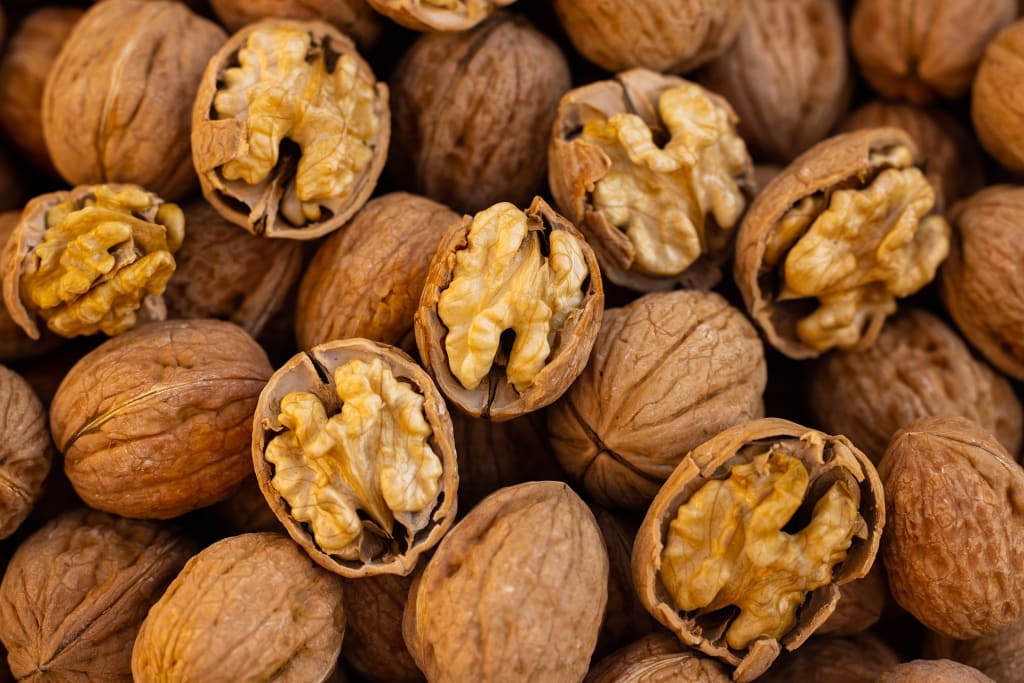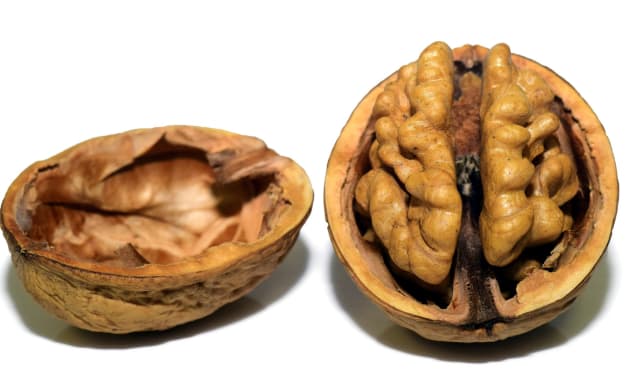Eating Walnuts Reduces Cardiovascular Disease Risks and Enhances Longevity
Benefits of walnuts

There is some evidence to suggest that eating walnuts may have a number of potential health benefits, including reducing the risk of cardiovascular disease and enhancing longevity. Walnuts are a good source of monounsaturated fats, which are known to be heart-healthy. They also contain a number of other nutrients, including fiber, vitamins, and minerals, which may contribute to their potential health benefits.
One study found that consuming a diet rich in walnuts was associated with a lower risk of coronary heart disease and stroke. Another study found that consuming walnuts was associated with lower blood pressure, lower LDL ("bad") cholesterol, and a lower risk of developing diabetes.
A recent study that was published in Nutrition, Metabolism & Cardiovascular Diseases further supports the idea that walnuts can help prevent cardiovascular disease. Researchers discovered that young adults who frequently consume walnuts are more likely to maintain superior physical health into middle age, are less likely to be fat, and have a decreased chance of developing cardiovascular disease.
Walnuts are regarded in traditional Chinese medicine (TCM) as having benefits for the kidneys, the brain, and life extension. Some of these protective properties have also been supported by numerous scientific investigations.
In addition to their potential cardiovascular benefits, walnuts have also been shown to have anti-inflammatory effects and may help to reduce the risk of certain types of cancer. They may also have a positive impact on brain health and cognitive function.
Walnuts Reduce Cardiovascular Disease Risk
The researchers followed the eating patterns of 3,092 healthy young individuals (aged 18 to 30) for 20 years starting in 1985 and kept track of their health indices for 30 years.
Three groups of participants were formed: those who consumed walnuts, those who consumed other nuts, and those who did not consume any nuts.
According to the study, people who consumed walnuts regularly as children had higher physical health indices than those who did not. They had lower scores for variables that affect the risk of cardiovascular disease, including body weight, waistline, blood pressure, and triglyceride levels.
The study showed that consuming nuts other than walnuts is also advantageous, but those who consumed walnuts had a lower likelihood of being fat than those who consumed other nuts.
The walnut-only eaters had a lower body mass index (BMI), a less obvious waistline, and a healthier weight index than the other nut eaters after 30 years, putting them at a decreased risk for cardiovascular disease.
The USDA National Nutrient Database states that 100 g (3.52 ounce) of walnuts contain the following nutrients:
Protein content: 15.2 g (0.54 oz)
Dietary fiber: 6.7 g (0.24 oz)
Fat: 65.2g (2.3 oz)
Alpha-linolenic acid, which makes up 9.1 grams or 0.32 ounces of the fat in walnuts, and linoleic acid, which makes up 38.1 grams or 1.34 ounces of the fat, are both polyunsaturated fatty acids that decrease cholesterol. Most other nuts don't contain alpha-linolenic acid in particular.
The beneficial fat in walnuts can lower the risk of cardiovascular disease, according to studies published in the American Journal of Clinical Nutrition.
Walnuts Reduce the Risk of Brain Disease
Walnuts have a positive impact on the brain. Walnuts are high in antioxidants and have anti-inflammatory qualities, which can enhance cognitive function, lower the risk of mild cognitive impairment and Alzheimer's disease, and slow the progression of the disease, according to a study published in Nutrients. Additionally, it can lessen the chance of developing depression, Parkinson's disease, and stroke.
Walnuts' capacity to lower free radicals in the body is one of their advantages for improving brain health. Since they are chemically unstable, free radicals can harm cells by chemically interacting with their lipids, proteins, and nucleic acids. The body will age more quickly if there are too many free radicals present. In this regard, the brain is particularly susceptible to the impacts of free radicals.
According to a poll of more than 15,000 women over the age of 70, those who consumed at least five ounces of nuts each week had two years less cognitive age than those who did not. The Journal of Nutrition, Health & Aging published the findings. The University of California, Los Angeles (UCLA) research also published a finding showing that both young and old people can benefit from eating a regular supplement of walnuts.
Walnuts Strengthen the Brain and Nourish the Kidneys
TCM holds walnuts in high respect for their ability to enhance the brain. Walnuts resemble the brain very much, said Hu Naiwen, a Chinese medicine practitioner from Shanghai Tongdetang in Taiwan, on the NTDTV program. According to TCM, objects with the same or similar shapes might enhance one another's health. It is therefore not surprising to learn that walnuts can support the brain.
According to TCM philosophy, walnuts have the effect of strengthening the essence and invigorating the kidney, which is necessary for the brain and central nervous system (CNS) to get food from the kidney essence.
In TCM, "essence" refers to a highly nourishing liquid that is housed within the internal organs. Essence consists of both the nutrients ingested after birth and the living components inherited from the parents. Consuming walnuts can replace kidney essence and nourish the brain while having a longevity-enhancing impact. Aging is caused by the constant consumption of essence.
The most recent study, which was revealed in the American Journal of Nephrology, also supported the notion that consuming walnuts lowers the likelihood of developing chronic kidney disease, which is good for the kidneys. The death rate is decreased in people with chronic renal disease who consume walnuts.
Walnuts Are an Excellent Tonic for the Elderly
He Xia, a Japanese TCM physician, suggested walnuts as a nutritious food supplement, particularly for the elderly, in an interview with The Epoch Times. Elderly people should have one or two walnuts in the morning and evening, according to Dr. He, to aid with symptoms including vertigo, sleeplessness, palpitations, forgetfulness, and loss of appetite. Long-term walnut consumption can also enhance the color, gloss, and health of your hair.
The thin walnut sheath has medicinal value for people who suffer from sleeplessness. When the walnut is cracked open, the kernels are revealed to be sandwiched by a thin, leaf-like structure known as the sheath.
He advised soaking walnut sheaths in hot water before drinking if you have tension, sleeplessness, or dreamlike sleep. The sheaths from three grams (0.1 oz) of walnuts should be steeped in hot water for ten minutes before drinking. It is quite helpful to drink one glass in the morning and one in the evening before bed to reduce the symptoms of insomnia.
Conclusion
It is important to note that while there is some evidence to support the potential health benefits of consuming walnuts, more research is needed to fully understand their effects and the optimal amount to consume for maximum benefit. As with any dietary change, it is a good idea to speak with a healthcare professional before making significant changes to your diet.
About the Creator
Willie Wun
I am a senior who is very keen on health and longevity issues and would like to share such knowledge with whoever is interested in these areas. Please SUBSCRIBE if you find the information useful and I can be motivated to share them daily






Comments
There are no comments for this story
Be the first to respond and start the conversation.